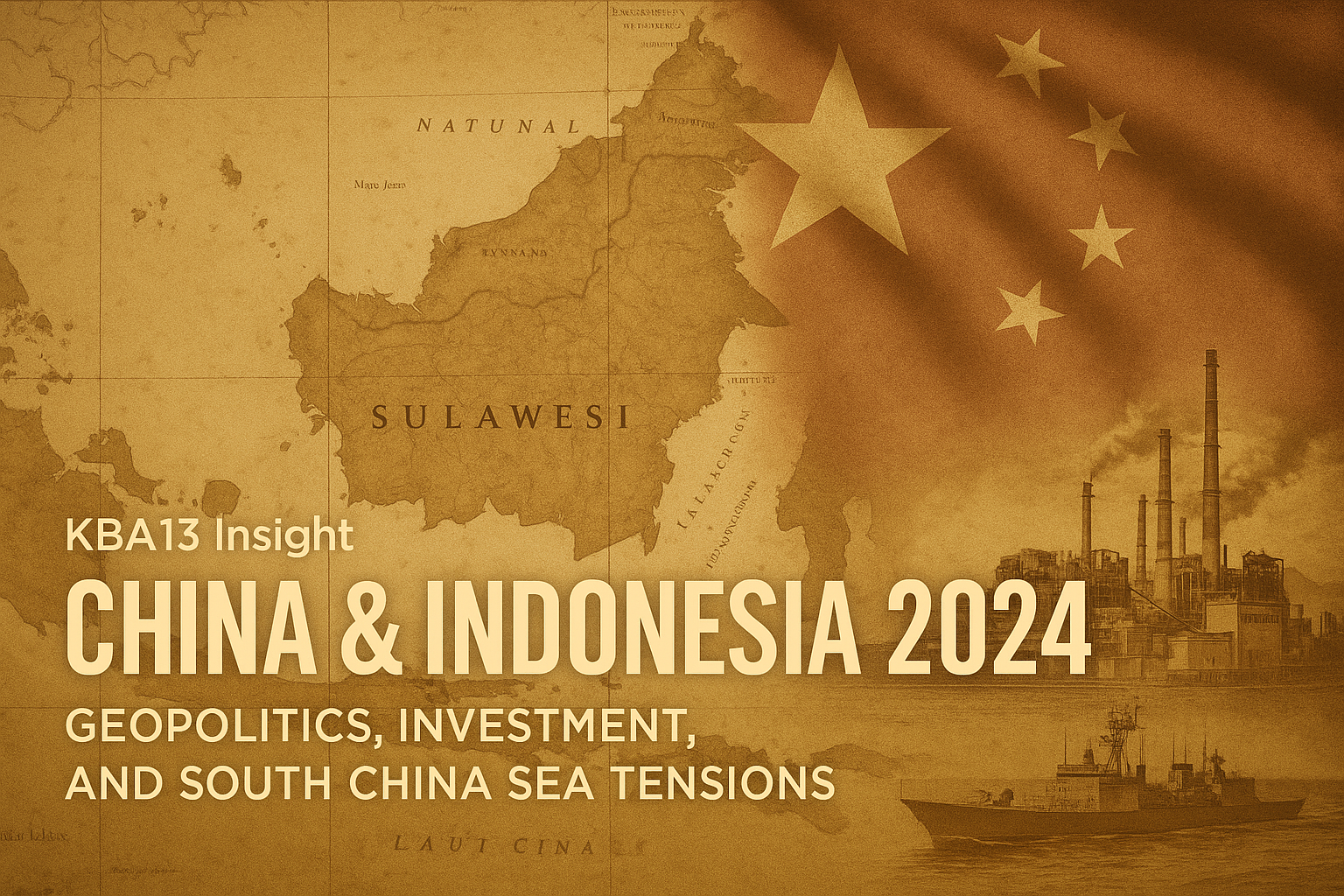Introduction
This essay examines the Chinese government’s strategy in navigating Indonesia’s tahun politik—the political year marked by the 2024 general and presidential elections. The stakes are high. As Indonesia undergoes a period of political transition, Beijing must ensure that its substantial investments, strategic projects, and long-term influence in the archipelago remain intact, regardless of who wins the presidency.
During a journey across Indonesia—from Banda Aceh to Merauke—one can see the visible footprint of Chinese presence. In Sulawesi, sprawling industrial complexes funded by Chinese capital dominate the landscape. Wuling cars, produced by Chinese automotive firms, line the highways. Residential enclaves for Chinese workers stand in stark contrast to the surrounding Indonesian communities. When viewed from satellite imagery, the industrial zones resemble “ringworm patches,” evidence of large-scale land clearing. While Indonesian laborers number in the hundreds of thousands, Chinese workers—though fewer—are strategically placed in critical positions. Their presence, exclusive settlements, and guarded compounds signify more than simple labor migration: they represent a calculated form of geopolitical expansion.
Chinese Investment as a Political Instrument
Chinese investments differ from many other foreign direct investment (FDI) models. Capital inflows are often tied to specific conditions: workers, technology, raw materials, and even construction equipment must be sourced directly from China. This practice creates enclaves of “imported labor,” fueling suspicions that some of these workers may have military or security affiliations. Whether soldiers in disguise or civilian technicians, their function extends beyond economics into security and political leverage.
Behind every high-profile project—whether nickel smelters in Sulawesi, high-speed rail in Java, or digital infrastructure across the archipelago—stands a web of agreements negotiated between Jakarta and Beijing. Yet before “paperwork” is finalized, Chinese strategists meticulously study Indonesia’s political weather. They ask, “Who holds real power within the palace? Which parties dominate parliament? How do Indonesian business elites perceive China? Can the general population accept the presence of Chinese investments and workers? Only when these questions are answered do capital and labor flow.
Thus, elections are not simply domestic rituals for Indonesians—they are strategic markers for Beijing. China seeks continuity, predictability, and, above all, guarantees that its investments will be protected under any incoming administration.
Elections as Gateways for Diplomacy
For China, Indonesia’s 2024 general and presidential elections function as gateways for diplomatic maneuvering. In parliament, Beijing watches for parties that could obstruct Chinese-backed legislation. Beyond parliament, they identify potential presidential candidates capable of securing regulatory stability. Chinese diplomats and state-linked enterprises carefully map alliances, gauging which political coalitions can safeguard Beijing’s long-term objectives.
This explains why Chinese interest in Indonesia’s elections goes beyond rhetoric. As the world’s fourth most populous country, an ASEAN leader, and a G20 economy, Indonesia is central to Beijing’s Belt and Road Initiative (BRI). The fate of projects—ports, industrial parks, energy grids—hinges on electoral outcomes. A president hostile to Beijing could jeopardize billions of dollars in contracts. Conversely, a leader supportive of Chinese involvement can ensure the seamless continuation of mega-projects, even if public resistance grows.
Debt, Dependency, and the Shadow of Neo-Colonization
Chinese investment patterns across Asia, Africa, and Latin America follow a recognizable template: capital injections disguised as partnerships but tied to debt obligations. Local infrastructure, from railways to energy plants, becomes collateral. Workers, machinery, and contractors are imported from China, reducing local economic spillover. Critics label this model “debt-trap diplomacy,” a form of twenty-first-century neocolonialism.
Indonesia, while larger and more diversified than many nations, is not immune. Acceptance of Chinese cooperation often comes with invisible costs: long-term debt, limited technology transfer, and social tensions between local communities and foreign workers. As seen in Sri Lanka, Laos, and parts of Africa, host countries that fail to manage these dynamics risk losing sovereignty over strategic assets.
Social Friction and the New Chinese Diaspora
The presence of Chinese workers in Indonesia creates a paradox when compared to historical Chinese migration. In the nineteenth century, Chinese migrants—traders, miners, and farmers—largely assimilated into local societies, adopting local languages, customs, and even religious practices. In contrast, the twenty-first-century Chinese workforce often resides in gated compounds with round-the-clock security. Their residential areas are fenced off, limiting interaction with local populations. This lack of integration generates perceptions of exclusivity, reinforcing stereotypes of “foreign occupation.”
Such arrangements may not appear in official diplomatic discourse, but they carry profound socio-political implications. Local resentment can be exploited by opposition parties, fueling nationalist narratives that portray China as a modern colonizer. These tensions complicate Jakarta’s balancing act between economic pragmatism and public sentiment.
Geopolitical Overlap: South China Sea and Domestic Politics
China’s ambitions in Indonesia cannot be separated from its broader strategic objectives in the South China Sea. As Beijing expands its maritime presence, Jakarta faces pressure both externally—through territorial disputes near the Natuna Islands—and internally, through its management of Chinese investments.
Any Indonesian president elected in 2024 who adopts a tougher stance toward Beijing risks retaliation not only in trade and investment but also in maritime provocations. Conversely, leaders perceived as overly accommodating risk accusations of “selling out” national sovereignty. This delicate balancing act makes China’s stake in Indonesia’s political year extraordinarily high.
Conclusion: Continuity as China’s Priority
China’s primary objective in Indonesia’s 2024 elections is continuity. Beijing is most comfortable if the winning party of the 2019 election succeeds in securing the presidency again. Continuity ensures that agreements signed under the previous administration remain intact, mega-projects proceed without disruption, and Indonesia continues to serve as a key hub in Beijing’s regional strategy.
For Indonesia, however, the challenge lies in balancing economic cooperation with political independence. Accepting Chinese investment provides immediate capital and infrastructure gains, but it risks creating long-term dependency and social discontent. The test for Indonesia’s future leadership is to harness the benefits of engagement with China while protecting sovereignty, ensuring transparency, and addressing the socio-economic impacts on local communities.
In short, Indonesia’s 2024 tahun politik is not only a domestic affair. It is a geopolitical stage on which China carefully calibrates its moves, ensuring that whoever sits in the presidential palace will not derail Beijing’s vision of an interconnected regional order anchored in Chinese power.



Leave a Reply